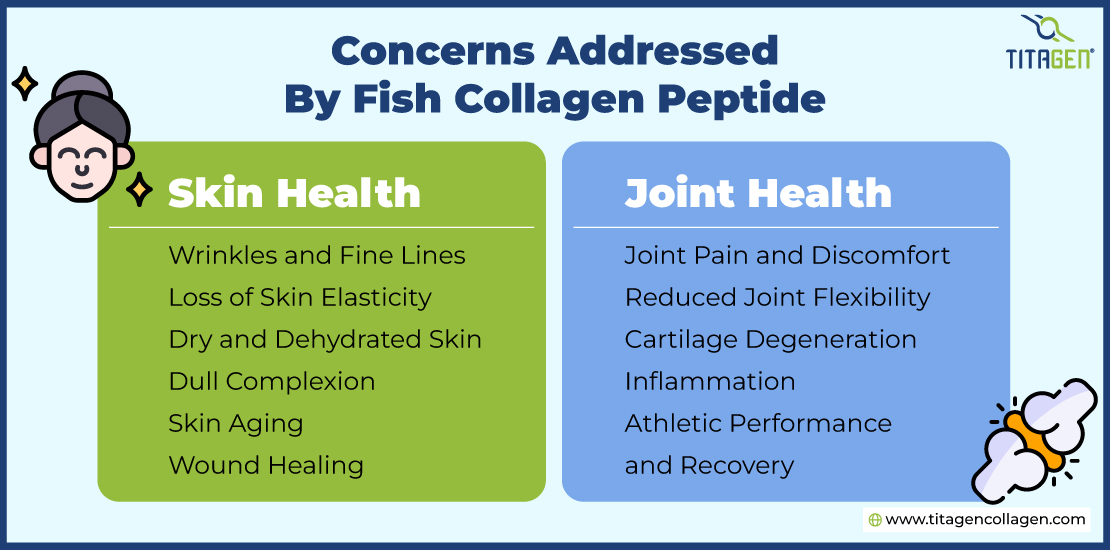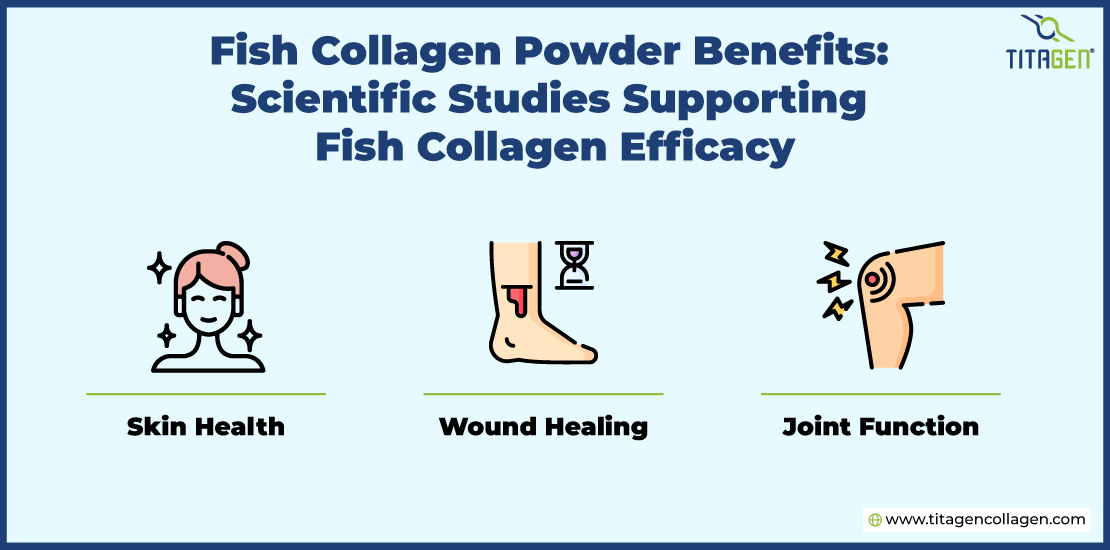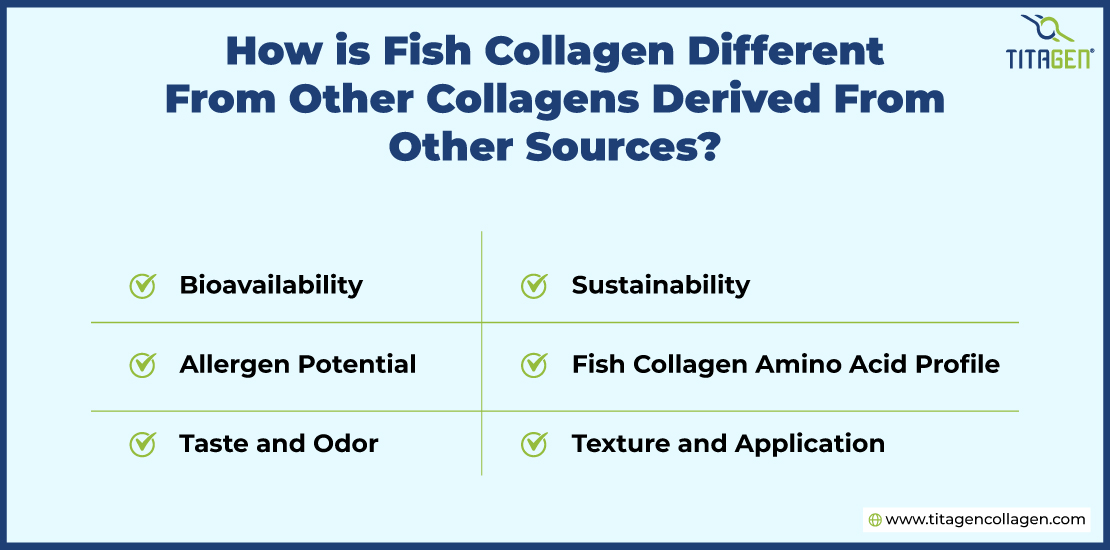Collagen, often hailed as the “glue” that holds our bodies together, is a crucial protein for maintaining skin, joints, and connective tissues. While collagen is widely known, the science behind fish collagen and how it works deserves exploration. Fish collagen peptide is a distinctive and valuable ingredient for overall health and wellness.
It is derived from the pristine sources of fish skin, scales, and bones, the natural and bioactive compound offers a myriad of benefits for the human body. The unique helical structure and high bioavailability, hydrolyzed fish collagen peptide has become a focal point in various applications such as pharmaceuticals, nutraceuticals, skincare, and more. Let’s explore more about the science behind fish collagen peptide, its mode of action, benefits in skin & joint health, and how is it different from collagens derived from other sources.
Understanding the Structure of Fish Collagen and its Benefits
Collagen is a fibrous protein with a triple helical structure, characterized by three polypeptide chains intertwined like a rope. Fish collagen, specifically derived from the scales, skin, or bones of fish, possesses a unique amino acid profile compared to other collagen sources such as bovine or porcine. The primary amino acids in fish collagen include glycine, proline, and hydroxyproline which are essential for collagen’s stability and function.
The helical structure of fish collagen peptides contributes to several beneficial properties, making it a popular ingredient in various applications. Here are some of the key benefits associated with the helical structure of fish collagen peptides:
- Bioavailability- The body can more readily absorb and utilize collagen, leading to better results in terms of skin health, joint support, and other applications.
- Structural Integrity- The unique structure provides collagen with its characteristic stability and structural integrity. It is crucial in supporting the connective tissues in the body, including skin, bones, tendons, and ligaments.
- Improved Solubility- The improved solubility makes it easier to incorporate collagen into various products, such as beverages, nutraceutical formulations, powders, and topical formulations.
- Cellular Interactions- The helical structure can facilitate interactions with cells and other components in the body, promoting cellular activities such as collagen synthesis and tissue regeneration.
- Texture and Mouthfeel- The structure of fish collagen peptides can influence the texture and mouthfeel of the final product in the food & beverage sector, providing a smoother and more pleasant experience for consumers.
How Does Fish Collagen Work?
Upon consumption, fish collagen undergoes a series of processes within the body that facilitate its incorporation into the skin, joints, and other connective tissues. The digestive system breaks down fish collagen into smaller peptides through the action of enzymes like collagenase and peptidases. These peptides are then absorbed into the bloodstream, circulating and reaching target tissues.
One remarkable aspect of fish collagen is its bioavailability, referring to the extent and rate at which a substance is absorbed and becomes available for use in the body. Fish collagen peptides are known for their high bioavailability, meaning they are efficiently absorbed and utilized by the body compared to some other collagen sources.
Absorption Rates and Bioavailability
Several factors contribute to the impressive absorption rates and bioavailability of fish collagen. The smaller size of marine fish collagen peptides, resulting from the hydrolysis process during production, plays a crucial role. The reduced molecular weight allows easier absorption through the intestinal barrier, enhancing the delivery of collagen peptides to target tissues.
Moreover, the composition of amino acids in fish collagen contributes to its bioavailability. The abundance of glycine facilitates rapid absorption. Studies have shown that fish collagen peptides reach higher levels in the bloodstream than other collagen types, making them an efficient choice for those seeking collagen supplementation.
Concerns Addressed by Fish Collagen Peptide

Fish collagen is used for its potential benefits in addressing various skin and joint health issues. While individual responses can vary, here are some common problems in skin and joint health that fish collagen may potentially help address:
1) Skin Health
- Wrinkles and Fine Lines- Fish collagen is believed to support skin elasticity and hydration, potentially reducing the appearance of wrinkles and fine lines.
- Loss of Skin Elasticity- Collagen is a key component in maintaining skin firmness and elasticity. Fish collagen may contribute to restoring and preserving these qualities, addressing issues related to sagging or loss of skin elasticity.
- Dry and Dehydrated Skin- Fish collagen peptides may enhance skin hydration by promoting the synthesis of hyaluronic acid, a molecule that helps retain water in the skin.
- Dull Complexion- Improved skin hydration and collagen synthesis may produce a more vibrant and radiant complexion.
- Skin Aging- As a natural part of aging, collagen production decreases, leading to changes in skin structure and appearance. Fish collagen may help counteract these effects.
- Wound Healing- Collagen is crucial for the wound healing process. Fish collagen may support the formation of granulation tissue and facilitate the migration and proliferation of skin cells, potentially aiding in wound healing.
2) Joint Health
- Joint Pain and Discomfort- Fish collagen is thought to support joint health by influencing the synthesis of collagen in cartilage. It may help reduce joint pain and discomfort associated with conditions like osteoarthritis.
- Reduced Joint Flexibility- Collagen is a major component of cartilage, which cushions and supports joints. Fish collagen may contribute to the maintenance and restoration of joint flexibility.
- Cartilage Degeneration- Osteoarthritis and other joint conditions are often characterized by the degeneration of cartilage. Collagen peptides may play a role in supporting the regeneration of cartilage tissue.
- Inflammation- Some research suggests that collagen peptides may have anti-inflammatory effects, which could be beneficial for managing joint inflammation.
- Athletic Performance and Recovery- Athletes and individuals engaged in physical activities may benefit from collagen supplementation for joint support and enhanced recovery.
Fish Collagen Powder Benefits: Scientific Studies Supporting Fish Collagen Efficacy

Numerous scientific studies have explored the efficacy of fish collagen in promoting skin health, joint function, and overall well-being. These studies provide valuable insights into the mechanisms through which fish collagen exerts its beneficial effects.
1) Skin Health
A study published in the Journal of Cosmetic Dermatology (2021) investigated the effects of fish collagen peptides on skin hydration and elasticity. The results indicated a significant improvement in skin hydration and elasticity, suggesting that fish collagen supplementation could contribute to enhanced skin moisture and reduced signs of aging.
2) Wound Healing
Research published in Marine Drugs (2022) explored the potential of fish collagen in wound healing. The study demonstrated that fish collagen promoted cell migration and collagen synthesis, accelerating the wound-healing process. This suggests that fish collagen may not only benefit skin health but also support the body’s natural healing mechanisms.
3) Joint Function
A clinical trial published in the International Journal of Molecular Sciences (2021) investigated the impact of fish collagen peptides on joint pain and function in individuals with osteoarthritis. The results indicated a significant reduction in joint pain and improved joint function in the group receiving fish collagen peptides, highlighting its potential as a supportive therapy for joint health.
How is Fish Collagen Different From Other Collagens Derived From Other Sources?

Collagen is a structural protein found in the connective tissues of animals, and collagen supplements are derived from various sources. Fish collagen is one type of collagen that is distinct from collagen derived from other sources. Here are some key differences between fish collagen and collagen from other sources:
- Bioavailability- Fish collagen is often considered to have high bioavailability due to its smaller peptide size and the helical structure of collagen peptides.
- Fish Collagen Amino Acid Profile- It contains a unique amino acid profile, including high levels of glycine, proline, and hydroxyproline.
- Allergen Potential- It is a suitable alternative for individuals with allergies to bovine or porcine collagen.
- Taste and Odor- It may have a milder taste and odor compared to some other collagen sources, making it more versatile for various applications.
- Texture and Application- It is often preferred in cosmetic and skincare products due to its texture and compatibility with formulations.
- Sustainability- Fish Collagen Peptide is sourced from fish by-products may contribute to more sustainable practices.
Conclusion
The science behind fish collagen reveals a protein with a unique structure and exceptional bioavailability. The triple helix structure, amino acid composition, and hydrolysis process during production contribute to the effectiveness of fish collagen in promoting skin health, supporting joint function, and aiding in wound healing.
Scientific studies provide substantial evidence supporting the efficacy of fish collagen, further reinforcing its potential as a valuable supplement for those seeking to enhance overall well-being. As we continue to unravel the mysteries of collagen and its applications, fish collagen stands out as a promising option backed by cutting-edge research. Whether you’re interested in maintaining youthful skin or supporting joint health, understanding the science behind fish collagen empowers you to make informed choices for a healthier, more vibrant life.
About Titan Biotech
Titan Biotech Limited stands as a leading manufacturer and exporter of biological products, catering to diverse industries including Pharmaceutical, Nutraceutical, Food and Beverages, Cosmetic, Veterinary, and Animal Feed. With an illustrious track record spanning over 30 years and a formidable market presence extending to more than 100 countries, Titan Biotech consistently pushes the boundaries of research and development, striving to provide unparalleled quality in biological products.
Our unwavering commitment to a policy of total customer satisfaction is at the core of our operations. This commitment is manifested through the delivery of the highest quality products and the provision of responsive customer support services. We recognize that the quality of our offerings is paramount, and as such, we continuously emphasize supplying products of uncompromised excellence. Beyond quality, we are dedicated to offering the most competitive prices in the market, fostering success for our clients, and creating advantageous situations within the marketplace.
At Titan Biotech Limited, our vision is rooted in a relentless pursuit of excellence, ensuring that our biological products not only meet but exceed the expectations of our diverse clientele. Through our decades of experience, global presence, and commitment to innovation, we remain at the forefront of the industry, driving positive change and contributing to advancements in various sectors.
Being the leading producer of fish collagen peptides, we supply premium-quality products. If you are looking for biological products in Korea then you can contact us for customized solutions.
References:
- https://www.ncbi.nlm.nih.gov/pmc/articles/PMC8176521/
- https://www.jstage.jst.go.jp/article/dmj/advpub/0/advpub_2020-446/_pdf
- https://www.ncbi.nlm.nih.gov/pmc/articles/PMC7826754/
- https://www.ncbi.nlm.nih.gov/pmc/articles/PMC8780088/
- https://www.proquest.com/openview/66fb1c83e71a4bc6219eb61dd98d5bf7/1?pq-origsite=gscholar&cbl=49301

